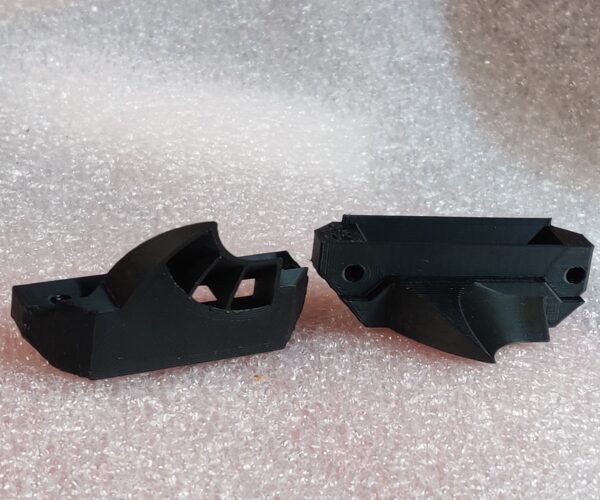Printing MK4 parts in Prusament PC Blend Carbon Fiber
I guess this might be considered a modification so hopefully this is the correct forum. I posted this to Reddit but also wanted to get the opinion of some users over here.
What’s the general consensus on printing parts for the MK4 in Prusament PC Blend Carbon Fiber? Seems like it would be strong and heat resistant but maybe too brittle and perhaps too rigid.
I’m interested in eventually enclosing mine (it’ll be in my work-from-home office and the fumes can give me a headache) and printing in some higher temperature ranges so PC-CF parts seem like a good idea.
Voron parts are designed specifically for ABS and even account for shrinkage in their design. I know Prusa must use PETG for a reason so I wouldn’t want to switch to parts in a different filament if it’s going to cause problems.
I know PC-CF would be overkill but I would rather overbuild today than rebuild tomorrow. My concern is that PETG is chosen for these printers for a specific reason (e.g. it can flex more before breaking) and that switching to a more rigid/brittle PC-CF would introduce other issues down the road.
RE: Printing MK4 parts in Prusament PC Blend Carbon Fiber
I was thinking the same thing as well..especially becuase of its properties and and ease of printing. however if PETG is acceptable ( i will put mine in an enclosure as well) I will stick to PETG as I can print it easily and consistently and have plenty on hand.
RE:
If you guys want to replace PETG with another filament, instead of PC-CF, I'd try ASA or ABS. These have much better heat endurance than PETG and they're also more flexible than PC-CF. The only possible drawback is warping when printing large parts, specially if you don't use an enclosure.
RE: Printing MK4 parts in Prusament PC Blend Carbon Fiber
Like Artur wrote, ABS or ASA are the obvious choice if you want better heat stability than with PETG. They are also closer to the flexibility of PETG even if they tend to be a bit more rigid (but not nearly as much as PC-CF).
Layer adhesion and warping can be big issues with those two if you print them without enclosure. I have had good experiences with black TitanX, which is a type of heavily modified ABS but seems to behave much like ABS, minus the warping and without being just as tricky regarding layer adhesion. It can be printed without enclosure even if printing with it is preferable.
My Mini Afterburner toolhead in the Voron 0.1 is printed in PC-Blend, so is the bed assembly. Warping is a very big issue with it. Probably one would need to anneal it after print as the tensions tend to warp the part post release from the build plate even when printing at an enclosure temp of 60°C. For small parts of 10 cm and less, the warping can be acceptable though. The PC-Blend extruder is working splendidly and shows no signs of cracking or anything. It does appear more rigid though and vibrations tend to be tampened more by ABS I think. PC-CF should be even more rigid than that but I don't know if it is more cracking prone than PC-Blend, it is certainly much easier to print though and even more heat stable and resistant against creep.
PC-Blend or PC-CF is for more extreme conditions (enclosure temps of above 60°C) but in most cases probably more of an "enthusiast solution".
Mk3s MMU2s, Voron 0.1, Voron 2.4
RE: Printing MK4 parts in Prusament PC Blend Carbon Fiber
FormFutura ApolloX (ASA equvalent) is also very easy to print. I printed some spare fan shrouds with this material. I used the textured sheet with glue-stick and the parts came off easily, no warping.
RE: Printing MK4 parts in Prusament PC Blend Carbon Fiber
I read in some reviews that supposedly layer adhesion is rather poor for ApolloX, even for an ASA. I take it that this will be vastly effected by enclosure temps, part cooling fan and printing speed among others but I wonder if it is possible to get good layer adhesion under adequate settings. I am looking for a new go to ASA filament but maybe I just need to sample a few choices. So far I only know Fillamentum ASA Extrafill.
Mk3s MMU2s, Voron 0.1, Voron 2.4
